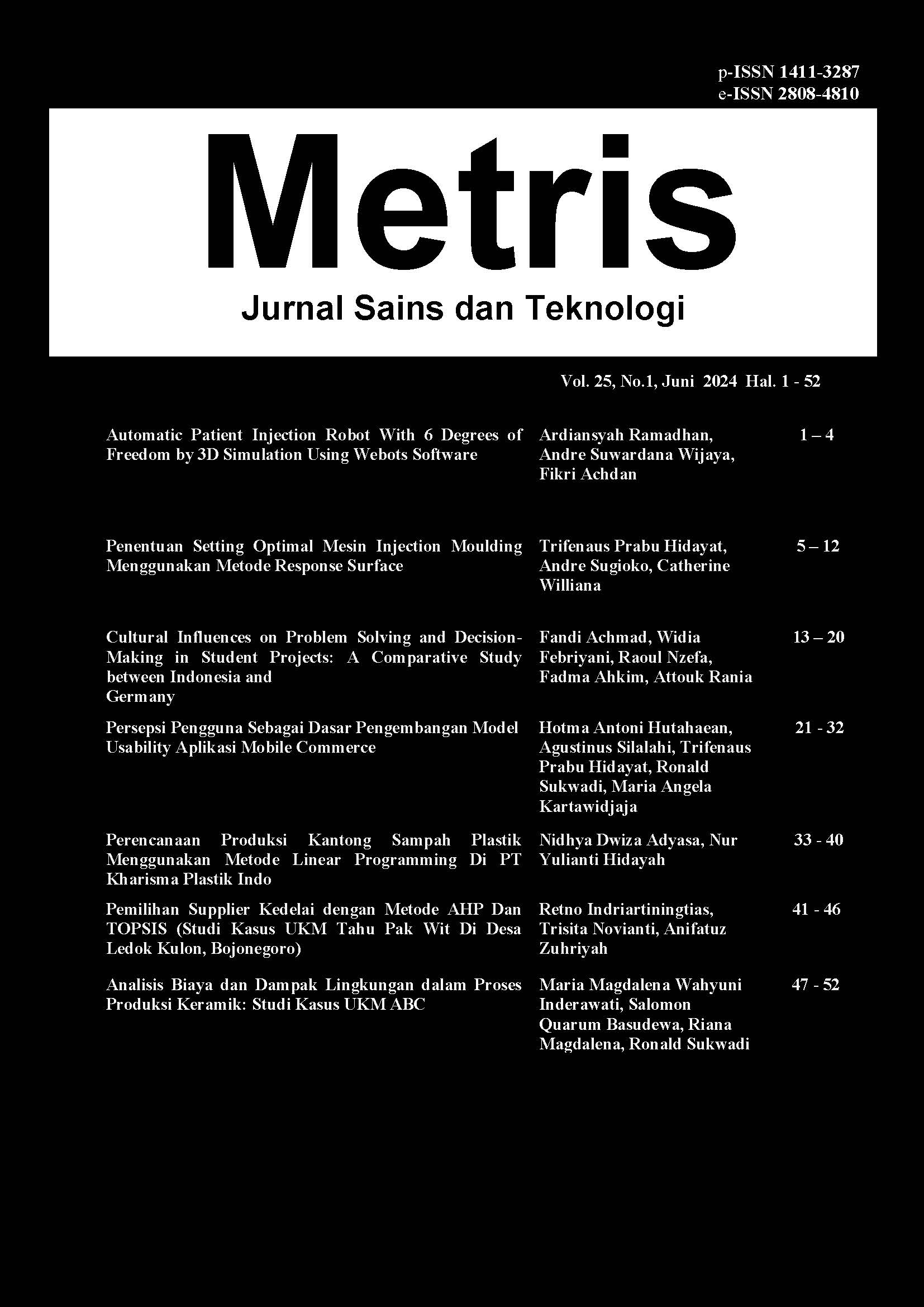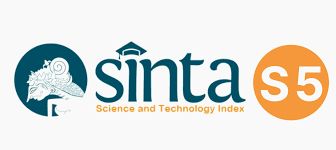Cultural Influences on Problem Solving and Decision-Making in Student Projects: A Comparative Study between Indonesia and Germany
DOI:
https://doi.org/10.25170/metris.v25i01.4519Keywords:
Knowledge Management, Cultural influence, Problem-solving, Decision-making, Student projectAbstract
Differences in cultural dimensions across countries can influence approaches and behavior patterns in education. Therefore, this study aims to analyze the influence of culture on problem-solving and decision-making in student projects in Indonesia and Germany. A comparative approach between the two countries identifies significant cultural differences in power distance, individualism, masculinity, uncertainty avoidance, long-term orientation, and indulgence. The research method used is a qualitative approach with descriptive analysis. Data was collected through interviews and observations of students involved in the project. The study results show that cultural differences affect students' approaches to problem-solving and decision-making. In Indonesia, group cooperation and conformity to social norms play an important role, while independence and critical thinking are prioritized in Germany. The implications of this research are the importance of increasing cultural awareness, developing collaborative skills, increasing independence and critical thinking, and empowering students with cultural knowledge. By understanding cultural differences and taking the right steps, educators can create an inclusive learning environment and prepare students to face the challenges of an increasingly globalized world.
References
Achmad, F., Abdillah, I. T., & Amani, H. (2023). Decision-Making Process for Tourism Potential Segmentation. International Journal of Innovation in Enterprise System, 7(01):19-30. DOI: https://doi.org/10.25124/ijies.v7i01.204
Achmad, F., Prambudia, Y., & Rumanti, A. A. (2023). Improving tourism industry performance through support system facilities and stakeholders: The role of environmental dynamism. Sustainability, 15(5):4103. DOI: https://doi.org/10.3390/su15054103
Achmad, F., Prambudia, Y., & Rumanti, A. A. (2023). Sustainable Tourism Industry Development: A Collaborative Model of Open Innovation, Stakeholders, and Support System Facilities. IEEE Access, 11: 83343 – 83363. DOI: 10.1109/ACCESS.2023.3301574
Artina, B. S., Desnasari, D., Fitriyah, F., & Rizkita, R. G. (2020, May). The workforce in Indonesian organizations: An analysis based upon the cultural dimensions of Hofstede’s model. In Journal of International Conference Proceedings (JICP) ,3(1):56-64. DOI:https://doi.org/10.32535/jicp.v2i4.780.
Bailey, R. K., Mokonogho, J., & Kumar, A. (2019). Racial and ethnic differences in depression: current perspectives. Neuropsychiatric disease and treatment, 603-609. DOI: https://doi.org/10.2147/NDT.S128584
Da’as, R. A. (2019). Teachers’ skill flexibility: Examining the impact of principals’ skills and teachers’ participation in decision making
during educational reform. International Journal of Educational Management, 33(2):287-299. DOI: https://doi.org/10.1108/IJEM12-2017-0382
De Wit, H., & Altbach, P. G. (2021). Internationalization in higher education: global trends and recommendations for its future. Policy Reviews in Higher Education, 5(1): 28-46. DOI: https://doi.org/10.1080/23322969.2020.1820898
Dickinson, R. E. (2013). The Regions of Germany: A Geographical Interpretation. London: Routledge. DOI:https://doi.org/10.4324/9781315007557.
Hofstede Insight. (2023). Country Comparision Tool. (online). Accessed Jan, 20, 2023. Available at: https://www.hofstedeinsights.com/countrycomparisontool?countries=germany,indonesia
Hofstede, G. (2009). Geert Hofstede cultural dimensions.
Hu, Y. H., Yu, H. Y., Tzeng, J. W., & Zhong, K. C. (2023). Using an avatar-based digital collaboration platform to foster ethical education for university students. Computers & Education, 104728. DOI: https://doi.org/10.1016/j.compedu.2023.104728
Ismail, I., Ali, H., & Us, K. A. (2022). Factors Affecting Critical and Holistic Thinking in Islamic Education in Indonesia: Self-Concept, System, Tradition, Culture.(Literature Review of Islamic Education Management). Dinasti International Journal of Management
Science, 3(3): 407-437. DOI: https://doi.org/10.31933/dijms.v3i3.1088
Ivancovsky, T., Shamay-Tsoory, S., Lee, J., Morio, H., & Kurman, J. (2019). A dual process model of generation and evaluation: A theoretical framework to examine cross-cultural differences in the creative process. Personality and Individual Differences, 139: 60-68.
DOI: https://doi.org/10.1016/j.paid.2018.11.012
Katzman, N. F., & Stanton, M. P. (2020). The integration of social emotional learning and cultural education into online distance learning curricula: Now imperative during the COVID19 pandemic. Creative Education, 11(9):1561-1571. DOI: 10.4236/ce.2020.119114
King, R. B., Li, J., & Leung, S. O. (2023). The cultural correlates of learning poverty: The roles of long-term orientation and power distance. International Journal of Intercultural Relations, 95, 101816. DOI: https://doi.org/10.1016/j.ijintrel.2023.101816
Kwangmuang, P., Jarutkamolpong, S., Sangboonraung, W., & Daungtod, S. (2021). The development of learning innovation to enhance higher order thinking skills for students in Thailand junior high schools. Heliyon, 7(6):e07309. DOI:https://doi.org/10.1016/j.heliyon.2021.e07309
Lapitan Jr, L. D., Tiangco, C. E., Sumalinog, D. A. G., Sabarillo, N. S., & Diaz, J. M. (2021). An effective blended online teaching and learning strategy during the COVID-19 pandemic. Education for Chemical Engineers, 35: 116-131. DOI:https://doi.org/10.1016/j.ece.2021.01.012
Marinoni, G., Van’t Land, H., & Jensen, T. (2020). The impact of Covid-19 on higher education around the world. IAU global survey report, 23, 1-17.
Miao, C., Humphrey, R. H., & Qian, S. (2020). The cross‐cultural moderators of the influence of emotional intelligence on organizational
citizenship behavior and counterproductive work behavior. Human Resource Development Quarterly, 31(2): 213-233. DOI:https://doi.org/10.1002/hrdq.21385
Oxenswärdh, A., & Persson-Fischier, U. (2020). Mapping master students’ processes of problem solving and learning in groups in sustainability education. Sustainability, 12(13): 5299. DOI: https://doi.org/10.3390/su12135299
Pan, G., Seow, P. S., Shankararaman, V., & Koh, K. (2021). An exploration into key roles in making project-based learning happen: Insights from a case study of a university. Journal of International Education in Business, 14(1): 109-129. DOI:https://doi.org/10.1108/JIEB-02-2020-0018
Pushkarev, Y. V., & Pushkareva, E. A. (2019). Communication foundation for intellectual culture: Tendencies of contemporary development. XLinguae, 12(4): 212. DOI: 10.18355/XL.2019.12.04.18
Riwukore, J. R., Susanto, Y., Pilkandis, J., & Habaora, F. (2021). Analysis of employee performance in the Department of Education
and Culture, Lubuklinggau City. Asia Pacific Journal of Management and Education (APJME), 4(2): 95-109. DOI:https://doi.org/10.32535/apjme.v4i2.1149
Sagitaningrum, D., & Frisko, D. (2016). Corporate Social Responsibility: Keterkaitan Letak Geografis Terhadap Desain Program dan
Pelaporan Perusahan. Jurnal Ekonomi dan Bisnis, 18(3): 43-58. DOI: https://ejournal.uksw.edu/jeb
Sugiyono, D. (2013). Metode penelitian pendidikan pendekatan kuantitatif, kualitatif dan R&D. Bandung: Alfabeta.
Sutarto, S., Sari, D. P., & Fathurrochman, I. (2020). Teacher strategies in online learning to increase students’ interest in learning during
COVID-19 pandemic. Jurnal Konseling dan Pendidikan (JKP), 8(3): 129-137.
Voegel, J., & Wachsman, Y. (2022). The effect of culture in containing a pandemic: The case of COVID-19. Journal of Risk Research, 25(9):
-1084. DOI:https://doi.org/10.1080/13669877.2021.1986566
Yuldashov, I., Parpiev, O., Makhmutaliev, A., Tukhtanazarov, I., & Umaralievich, K. U. (2021). Pedagogical bases of formation of
physical culture and social culture in Youth. Asian Journal of Multidimensional Research, 10(11): 54-58. DOI: 10.5958/2278-4853.2021.01010.7
Yudono, K. D. A. (2021). Preferensi modalitas belajar vark siswa sekolah dasar kelas III. Jurnal Ilmiah KONTEKSTUAL, 3(01): 26-32. DOI: https://doi.org/10.46772/kontekstual.v3i01.480












